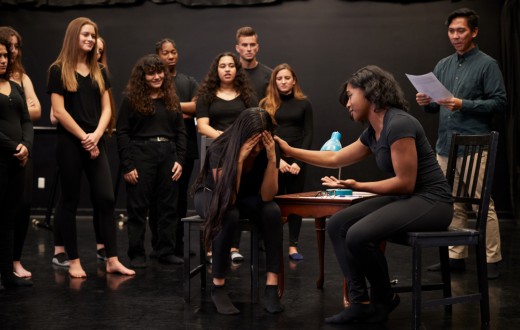If you’re reading these pages, it’s a safe bet that you’ve already been bitten by the acting bug, in one capacity or another. Somewhere along the line, anyone working as an actor, dancer, singer, agent, director or casting director saw a film or a show or a play or a musical that moved them in a way they had never been moved before.
Like you, they saw the possibility of magic in performance. Like you, they were touched in a deep emotional place that made them think, “Yes. I must be involved in this.”
First of all, here’s a salute to everyone, no matter where you are in your career, who has the courage to follow their mad dreams.
But mainly this is for those who have recently made the decision to join in this lunacy, or who are considering taking the plunge: where to begin? How do you even get started in acting?
First of all, keep in mind that everyone had to start somewhere! Even the greatest natural talents have honed their craft. Sure, a Meryl Streep or Anthony Hopkins was born talented. But they also worked and worked and worked some more to become what they are today.
So with that in mind, here are some tips to help you come out of the gate with the tools you need to succeed.
1. Classes
Not all of us are lucky enough to start out in a university-level theater program. Hell, lots of us have no idea we want to act until well after college has ended. But this need not be a major obstacle. That’s not to say that you have nothing to learn, or that what is taught in university theater programs is useless, not at all. It’s only to suggest that there are many, many avenues down which you can pursue knowledge. Classes in scene study, improv, voice, movement and a myriad of other valuable skills you will use in your acting career can often be found in communities of all sizes. Honestly, there’s almost no such thing as a bad class. Just getting comfortable with getting up in front of people and performing in any capacity is something you cannot get enough of, at any point in your career. Look for continuous learning or adult learning classes at nearby universities, community colleges, and in conjunction with community theater groups in your area.
2. Work shows
While you’re reaching out to all those people, ask if you can help out on their latest show! This is often the most immersive, hands-on way you can get up to speed on how this whole acting thing works. Working with a variety of directors on a variety of shows is a magnificent way to learn not only how to act, but how to act on stage, in front of real, live, actual people who paid money for a ticket. Audition for everything that comes along in your community. Even the chorus parts contain valuable learning experiences. And don’t shy away from doing whatever needs to be done. An actor who also has experience running a light board or running sound or hanging lights or building sets is an incalculable asset to any theater troupe. Getting your foot in the door is the important thing right now, and you will be grateful for all the experiences you get, even if you aren’t cast as Hamlet your very first time out auditioning.
3. Read, read, read.
Did you catch that? Once more with feeling: read. Read everything you can get your hands on, modern plays, TV scripts, movie scripts, classics. If you find an opportunity to take a class on Shakespeare, whether it be performing or simply studying his works, take it. The magic of his words and characters resonate through everything you see on television, stage or film. If you’re not quite ready to tackle the Bard just yet, even using modern playwrights as a tool to get your mind–and your mouth–around how dialogue works can help you immensely. And don’t just read silently! Get up on your feet and work some monologues! Run some scenes with your friends! Couldn’t hurt to memorize a few monologues for use in auditions either, hint hint.
4. Watch
Go see every play you can in your town. Everything from community theater to university shows. I promise if you go in with an open mind, there is something to be gleaned from each and every performance–even if the lesson is in what NOT to do! Also, don’t forget that we live in a new golden age for television. There are so many series out there that are towering achievements of performance, direction, plotting and cinematography. Delve. Go deep on your favorite show and analyze a character’s arc over a season, an episode, a scene. In short, be a sponge and apply what you learn in classes and from reading scripts to critically analyze what you see on the screen.
5. Network
Okay, now that you’ve made all these contacts in your community’s film and theater circles, and you’ve gotten your feet wet on educating yourself on acting, it’s time to network. Make friends, volunteer, reach out to people you’ve met and ask if they’ll work a monologue with you or if they’re interested in starting a reader’s group. Ask how you can help them with their auditions. Perhaps even more importantly, reach out in any way you can to your area’s theater troupes. Volunteer to be a docent, or help with strike, or build sets, or in marketing a show–whatever needs to be done. Developing a reputation as the guy or girl who can always be counted on to pitch in and lend a hand carries incalculable weight in the theater community. And those good vibes you’re slinging around will not be forgotten next time there’s an audition, I promise.
Most importantly of all, keep in mind that acting is a life-changing, ancient, transcendent, honorable craft, and we are very lucky to be able to do what we do in any capacity. Value and honor yourself and those around you who are also pursuing the muse, and she will reward you.
Now get out there!







